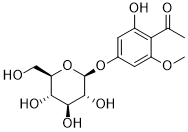AnnphenoneCAS# 61775-18-6 |

Quality Control & MSDS
Package In Stock
Number of papers citing our products

| Cas No. | 61775-18-6 | SDF | Download SDF |
| PubChem ID | N/A | Appearance | Powder |
| Formula | C15H20O9 | M.Wt | 344.3 |
| Type of Compound | Phenols | Storage | Desiccate at -20°C |
| Solubility | Soluble in Chloroform,Dichloromethane,Ethyl Acetate,DMSO,Acetone,etc. | ||
| General tips | For obtaining a higher solubility , please warm the tube at 37 ℃ and shake it in the ultrasonic bath for a while.Stock solution can be stored below -20℃ for several months. We recommend that you prepare and use the solution on the same day. However, if the test schedule requires, the stock solutions can be prepared in advance, and the stock solution must be sealed and stored below -20℃. In general, the stock solution can be kept for several months. Before use, we recommend that you leave the vial at room temperature for at least an hour before opening it. |
||
| About Packaging | 1. The packaging of the product may be reversed during transportation, cause the high purity compounds to adhere to the neck or cap of the vial.Take the vail out of its packaging and shake gently until the compounds fall to the bottom of the vial. 2. For liquid products, please centrifuge at 500xg to gather the liquid to the bottom of the vial. 3. Try to avoid loss or contamination during the experiment. |
||
| Shipping Condition | Packaging according to customer requirements(5mg, 10mg, 20mg and more). Ship via FedEx, DHL, UPS, EMS or other couriers with RT, or blue ice upon request. | ||

Annphenone Dilution Calculator

Annphenone Molarity Calculator
| 1 mg | 5 mg | 10 mg | 20 mg | 25 mg | |
| 1 mM | 2.9044 mL | 14.5222 mL | 29.0444 mL | 58.0889 mL | 72.6111 mL |
| 5 mM | 0.5809 mL | 2.9044 mL | 5.8089 mL | 11.6178 mL | 14.5222 mL |
| 10 mM | 0.2904 mL | 1.4522 mL | 2.9044 mL | 5.8089 mL | 7.2611 mL |
| 50 mM | 0.0581 mL | 0.2904 mL | 0.5809 mL | 1.1618 mL | 1.4522 mL |
| 100 mM | 0.029 mL | 0.1452 mL | 0.2904 mL | 0.5809 mL | 0.7261 mL |
| * Note: If you are in the process of experiment, it's necessary to make the dilution ratios of the samples. The dilution data above is only for reference. Normally, it's can get a better solubility within lower of Concentrations. | |||||

Calcutta University

University of Minnesota

University of Maryland School of Medicine

University of Illinois at Chicago

The Ohio State University

University of Zurich

Harvard University

Colorado State University

Auburn University

Yale University

Worcester Polytechnic Institute

Washington State University

Stanford University

University of Leipzig

Universidade da Beira Interior

The Institute of Cancer Research

Heidelberg University

University of Amsterdam

University of Auckland

TsingHua University

The University of Michigan

Miami University

DRURY University

Jilin University

Fudan University

Wuhan University

Sun Yat-sen University

Universite de Paris

Deemed University

Auckland University

The University of Tokyo

Korea University
- Colelomycerone A
Catalog No.:BCN0631
CAS No.:1191896-73-7
- Campsiketalin
Catalog No.:BCN0630
CAS No.:93675-96-8
- Ethyl 13-hydroxy-α-linolenate
Catalog No.:BCN0629
CAS No.:123435-84-7
- Ethyl 3,5-di-O-caffeoylquinate
Catalog No.:BCN0628
CAS No.:143051-74-5
- 1,6,2',6'-O-Tetraacetyl-3-O-trans-p-coumaroylsucrose
Catalog No.:BCN0627
CAS No.:138195-49-0
- 3-Hydroxy-p-menth-1-en-6-one
Catalog No.:BCN0626
CAS No.:61570-82-9
- 8,9-Dehydrothymol isobutyrate
Catalog No.:BCN0625
CAS No.:38146-79-1
- (+)-Perillaldehyde
Catalog No.:BCN0624
CAS No.:5503-12-8
- 1,7-Dimethoxyxanthone
Catalog No.:BCN0623
CAS No.:5042-06-8
- Swertianin 2-O-α-L-rhamnopyranosyl-(1→2)-β-D-xylopyranoside
Catalog No.:BCN0622
CAS No.:136832-00-3
- Bisisorhapontigenin C
Catalog No.:BCN0621
CAS No.:
- cis-Methylisoeugenol
Catalog No.:BCN0620
CAS No.:6380-24-1
- (3S,5S)-[4]-Gingerdiol
Catalog No.:BCN0633
CAS No.:1448789-37-4
- Calophyllic acid
Catalog No.:BCN0634
CAS No.:36626-19-4
- Isocalophyllic acid
Catalog No.:BCN0635
CAS No.:157810-76-9
- Bisisorhapontigenin B
Catalog No.:BCN0636
CAS No.:
- 4-(4-Hydroxy-3-methoxyphenyl)butane-1,2-diol
Catalog No.:BCN0637
CAS No.:39115-22-5
- (3S,5S)-[6]-Gingerdiol
Catalog No.:BCN0638
CAS No.:143615-76-3
- Gingerenone A
Catalog No.:BCN0639
CAS No.:128700-97-0
- cis-ε-Viniferin
Catalog No.:BCN0640
CAS No.:62250-12-8
- Chiricanine A
Catalog No.:BCN0641
CAS No.:350593-30-5
- Gneafricanin F
Catalog No.:BCN0642
CAS No.:477561-12-9
- Nandinaside A
Catalog No.:BCN0643
CAS No.:1813517-23-5
- [6]-Gingerdiol
Catalog No.:BCN0644
CAS No.:154905-69-8
[Research on chemical constituents from Artemisia annua ].[Pubmed:33787111]
Zhongguo Zhong Yao Za Zhi. 2021 Mar;46(5):1160-1167.
Chemical constituents were isolated and purified from the water extract of Artemisia annua by column chromatography of HP-20 macroporous resin, silica gel, ODS, Sephadex LH-20, HW-40, and semi-preparative RP-HPLC. Their structures were elucidated by physicochemical properties and spectral analyses. As a result, Fifteen compounds were isolated and identified as vitexnegheteroin M(1), sibricose A5(2), securoside A(3), citrusin D(4), Annphenone(5), E-melilotoside(6), esculetin(7), scopoletin-7-O-beta-D-glucoside(8), eleutheroside B_1(9), chrysosplenol D(10), patuletin-3-O-beta-D-glucopyranoside(11), quercetin-7-O-beta-D-glucoside(12), rutin(13), apigenin 6,8-di-C-beta-D-glucopyranoside(14), isoschaftoside(15), among them, compounds 1-4 were identified from Artemisia for the first time. Additionally, the isolates were evaluated for their inhibitory effects on the production of PGE_2 in LPS-simulated RAW264.7 macrophages. The results showed that compounds 1, 2, 8, and 10-15 could reduce PGE_2 levels, to a certain extent.
Cytoprotective activity of annphenone against oxidative stress-induced apoptosis in V79-4 lung fibroblast cells.[Pubmed:18550394]
Cell Biol Int. 2008 Sep;32(9):1099-107.
We have elucidated the cytoprotective effect of Annphenone (2,4-dihyroxy-6-methoxy-acetophenone 4-O-beta-D-glucopyranoside) against oxidative stress-induced apoptosis. Annphenone scavenged intracellular reactive oxygen species (ROS) and increased antioxidant enzyme activities. It thereby prevented lipid peroxidation and DNA damage, which was demonstrated by the inhibition of the formation of thiobarbituric acid reactive substance (TBARS), inhibition of the comet tail and decreased phospho-H2A.X expression. Annphenone protected Chinese hamster lung fibroblast (V79-4) cells from cell death via the inhibition of apoptosis induced by hydrogen peroxide (H2O2), as shown by decreased apoptotic nuclear fragmentation, decreased sub-G1 cell population and inhibited mitochondrial membrane potential (Deltapsi) loss. Taken together, these findings suggest that Annphenone exhibits antioxidant properties by inhibiting ROS generation and thus protecting cells from H2O2-induced cell damage.


